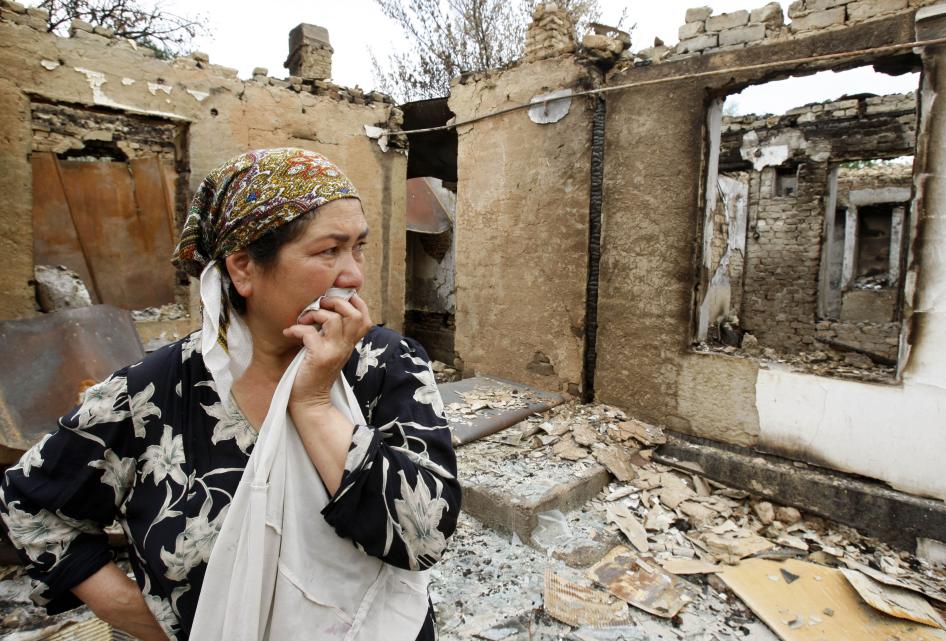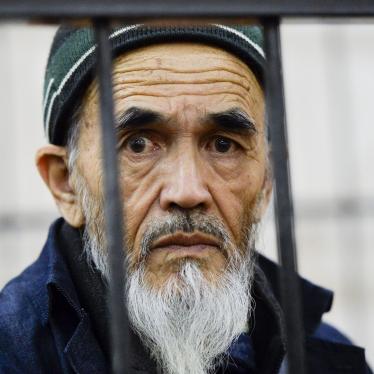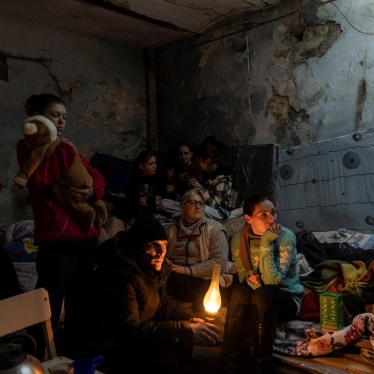(Berlin) – Authorities in Kyrgyzstan have failed to take necessary, if difficult, steps toward ensuring justice and accountability for abuses committed during and after the outbreak of violence in southern Kyrgyzstan a decade ago, Human Rights Watch said today.
Between June 10 and 14, 2010, ethnic violence raged in southern Kyrgyzstan. Over 400 people were killed and nearly two thousand homes were destroyed. But the authorities have failed to ensure accountability for crimes committed during the violence, or justice for the people arbitrarily arrested and convicted in trials marred by widespread allegations of ill-treatment and torture in the aftermath.
“Justice has been elusive for so many people who suffered horrific crimes during and after the violent events of June 2010,” said Mihra Rittmann, senior Central Asia researcher at Human Rights Watch. “While southern Kyrgyzstan has long ceased to be a site of open ethnic conflict, until there is accountability for past abuses, there will always be legitimate concerns about the prospect of long-term stability in the region.”
While horrific crimes were committed against both ethnic Uzbeks and Kyrgyz in June 2010, most of those who were killed or lost their homes in the mayhem were from the ethnic Uzbek community.
Kyrgyz authorities have held some people responsible for crimes committed during the June 2010 violence. According to government data published in 2017, “Courts have considered 286 cases involving 488 persons” in relation to the June 2010 violence. However, most criminal investigations into crimes committed during the violence, nearly 4,000 of over 5,000 cases, according to government data published in 2017, have been suspended because the accused could not be identified or could not be found.
The Kyrgyz government has not acknowledged that ethnic Uzbeks disproportionately were the victims of attacks or that attacks on ethnic Uzbek neighborhoods were systematic. Human Rights Watch noted in 2012 that the vast majority of criminal cases in which the victims were ethnic Uzbeks had yet to be investigated.
The government said in 2011 that both sides were “equally armed, committed violence against each other and suffered casualties.” This stance whitewashes the killings, suffering, and unfair trials that disproportionally affected ethnic Uzbeks, Human Rights Watch said.
An ethnic Uzbek lawyer from southern Kyrgyzstan, who asked not to be named out of fear of reprisals, described what the lack of accountability has meant for him and his community.
“Psychologically, it stays with you,” he told Human Rights Watch. “An act of reconciliation did not take place. Many friends, people who suffered, whose relatives were jailed – no one ever answered for [the abuses]. It makes you feel psychologically vulnerable. You still feel [vulnerable] today.”
Human Rights Watch also documented that the profoundly flawed criminal investigations and trials, mainly affecting the ethnic Uzbek minority, were marred by widespread arbitrary arrests and ill-treatment, including torture. Prosecutorial authorities refused to investigate torture allegations, and frequent physical attacks against defendants and their lawyers marred courtroom proceedings, Human Rights Watch found.
An independent international commission that carried out an investigation into the conflict at the request of the Kyrgyz government arrived at similar conclusions regarding abuses committed during and after the June 2010 violence.
The Kyrgyz government asserted in its 2016 report to the United Nations Committee on the Elimination of Racial Discrimination (CERD), that “All participants in criminal proceedings in Kyrgyzstan enjoy equal rights and have equal opportunities…” and that “there have been no reported instances of violations by judicial bodies of the right to a fair trial in criminal cases connected with the June 2010 events.”
However, the human rights organization, Bir Duino, cited official data to CERD showing that over 70 percent of the people criminally prosecuted in connection with the June 2010 violence were ethnic Uzbek. The group further noted that out of 105 people prosecuted for killings committed during the violence, 97 are ethnic Uzbek and seven are Kyrgyz.
The government stated that the authorities opened five criminal investigations into allegations of torture. Human Rights Watch has not been able to determine whether any officers were ever formally charged or prosecuted as a result of these investigations.
Ten years on, the ethnic Uzbek community in southern Kyrgyzstan retains an underlying sense of fear and insecurity, especially with respect to law enforcement and the judiciary. “As far as the courts are concerned, and in terms of political representation, nothing has changed,” an ethnic Uzbek human rights defender in southern Kyrgyzstan told Human Rights Watch. As a result, “it’s very hard for me to do my work.” He asked not to be named for fear of repercussions.
The Kyrgyz government should commit to ensuring accountability for its citizens, regardless of their ethnicity, and take meaningful steps toward addressing outstanding grievances of the ethnic Uzbek community in southern Kyrgyzstan, Human Rights Watch said.
Kyrgyz authorities should ensure thorough and impartial investigations into the use of torture during investigations and set up a review process for all criminal cases related to the clashes in which there were credible allegations of torture and other human rights violations against the defendants that may make the verdicts unsound. The government should renew any efforts to ensure proportionate ethnic representation in government, law enforcement, and the judiciary.
The authorities should also carry out the 2016 United Nations (UN) Human Rights Committee decision that calls for the release from prison of the human rights defender Azimjon Askarov, as he was detained and prosecuted in violation of his rights, including being tortured.
Following his December 2019 visit to Kyrgyzstan, the UN special rapporteur on minority issues, Fernand de Varennes, said that ethnic relations in Kyrgyzstan “remain fragile” and that factors including “underrepresentation of minorities” and “unfair treatment by law enforcement,” could “bring the level of inter-ethnic tension to a breaking point.”
“Peace and stability in southern Kyrgyzstan today are undermined by a legacy of injustice,” Rittmann said. “If the Kyrgyz authorities want to definitively turn the page, they need to do the hard work of confronting past injustices, and provide accountability and closure for all the victims of the June 2010 violence and its aftermath.”
For more details, please see below.
The 2010 Violence
Both ethnic Uzbeks and Kyrgyz fell victim to the June 2010 violence, which lasted four days, and left more than 400 people dead and nearly 2,000 houses destroyed. Starting the morning of June 11, after a fight broke out between a group of ethnic Uzbeks and Kyrgyz in the center of Osh, the largest city in southern Kyrgyzstan, crowds of ethnic Kyrgyz repeatedly attacked ethnic Uzbek neighborhoods, looting and setting fire to shops and homes, and killing people who remained.
Hundreds of thousands of people, mostly ethnic Uzbeks, were displaced fleeing the violence. There are strong indications that some military and police forces, either knowingly or unwittingly, facilitated attacks on ethnic Uzbek neighborhoods.
In the aftermath, Human Rights Watch research showed that the efforts at holding those responsible for the violence accountable was skewed against ethnic Uzbeks. The police led violent sweep operations in ethnic Uzbek neighborhoods, beating and insulting residents, looting their homes, and arbitrarily arresting hundreds of people. Ethnic Uzbeks told Human Rights Watch that investigators demanded bribes in exchange for not pressing charges, or to secure their release.
Law enforcement officers routinely ill-treated and tortured people detained in connection with the June violence. Human Rights Watch staff documenting abuses in the aftermath of the violence received accounts from people who had marks of beatings on their bodies. Human Rights Watch received credible information at that time about torture and ill-treatment in 65 cases.
June 2010 trials were also marred by serious violations of fair trial standards, harassment and physical attacks against lawyers, defendants, and even independent monitors during hearings. Human Rights Watch documented these violations in a June 2011 report “Distorted Justice.”
Courtroom attacks continued in protracted related proceedings. In March 2013, women in an Osh courthouse attacked an ethnic Uzbek defendant, including throwing a bottle and a bag at him. The women screamed at the judges and beat security officers as the women tried to get at the defendant. At Askarov’s Supreme Court hearing on May 13, 2020, aggressive observers insulted and threatened Askarov’s wife and his lawyers.
Azimjon Askarov
On May 13, 2020, Kyrgyzstan’s Supreme Court, in an egregious miscarriage of justice, upheld Askarov’s lifetime prison sentence. Askarov, 69, is a human rights defender from Bazar-Kurgan in southern Kyrgyzstan. He was arrested in June 2010, and found guilty of participating in mass disturbances, inciting ethnic hatred, and abetting the murder of a police officer. Like so many other cases at the time, Askarov’s investigation and trial were marred by allegations of torture and physical attacks on Askarov’s lawyer and on the defendants that seriously undermined the integrity of the hearings.
In 2016, the UN Human Rights Committee found that Askarov had been arbitrarily detained and tortured, and called for Askarov’s immediate release and the quashing of his conviction. Kyrgyzstan has persistently declined to carry out the ruling, failing to uphold its international legal obligations. Askarov, whose health has notably declined over the last 10 years, languishes in prison.
Government Efforts to Address Ethnic Tensions
The Kyrgyz government has taken some steps to address and mitigate ethnic tensions since June 2010, but these efforts have not gone far enough and have had little impact on addressing grievances that persist, Human Rights Watch said.
Most notably, the Kyrgyz government agreed to an independent investigation by the Kyrgyzstan Inquiry Commission led by Dr. Kimmo Kiljunen. In May 2011, the commission issued its findings and recommendations. The Kyrgyz government acknowledged that the commission carried out an “unbiased investigation.”
But the government dismissed outright the commission’s findings that ethnic Uzbeks had disproportionately suffered attacks, loss of life, and injury in the violence. Kyrgyz authorities have not carried out many of the report’s recommendations. They include giving Uzbek language “special status at municipal and regional levels in southern Kyrgyzstan,” and ensuring that June 2010 “prosecutions conform with international fair trial standards.”
After the report was published, the Kyrgyz parliament passed a resolution declaring Dr. Kiljunen persona non grata.
In 2013, the Kyrgyz government established a State Agency for Local Government Affairs and Interethnic Relations, tasked, among other things, with “taking measures for the free and equal development of ethnic groups of the Kyrgyz Republic and ensuring their rights.” The agency was envisaged as playing a key role in mitigating ethnic tensions, including by establishing 23 community-based reception centers to “create an early warning system for interethnic conflicts.”
The CERD in May 2018 and the UN special rapporteur on minority issues, who visited Kyrgyzstan in December 2019, have expressed concern about the agency and the lack of public awareness about the centers. Indeed, when asked about the centers, an Osh-based human rights defender told Human Rights Watch, “Actually, this is the first I am hearing of it – from you!” The UN committee said that Kyrgyzstan should take “all steps necessary to facilitate access by minorities to justice.”
Problematically, both the director and deputy director of the agency have in recent years claimed that ethnic minorities in Kyrgyzstan do not face discrimination or violations of their rights.
The government asserted in its 2017 report to CERD that “special attention is paid to ensuring that the different ethnic communities are represented in law enforcement agencies,” but did not present any data regarding the ethnic composition of the police. The government noted that two judges at the Supreme Court are members of an ethnic minority, but did not present data about the ethnic composition of the judiciary more broadly. According to government data from December 2019, ethnic Uzbeks make up just 1.2 percent of all civil servants in the country.
Three human rights defenders in southern Kyrgyzstan who regularly interact with law enforcement and courts of law as part of their human rights activities told Human Rights Watch that over the last 10 years, they have not observed a noticeable increase in the number of ethnic minorities in law enforcement or the judiciary. The numbers “aren’t at all proportionate, and where [there are ethnic minorities], it’s just lower level staff,” one human rights defender said.
Steps Forward
Even in the midst of the violent clashes in June 2010, many ethnic Kyrgyz, Uzbeks, and Russians saved the lives of their neighbors of other ethnicities, often at great risk to themselves.
Ten years later, in June 2020, it seems that in some communities in southern Kyrgyzstan, people of different ethnicities are rallying, this time in response to the global pandemic, which has had such a huge impact on health and deprived many of their livelihoods.
A local human rights defender told Human Rights Watch that in their town outside Osh, ethnic Uzbek and Kyrgyz have been working together during the pandemic to respond to the community’s needs. Another rights defender in Osh separately said that since quarantine measures were imposed to stem the spread of Covid-19, there has been a decline in anti-Uzbek commentary in the media and on the streets.
While some communities have found ways to move past the June 2010 violence, the Kyrgyz government still has a responsibility to acknowledge and provide accountability for past abuses.
The government should heed recommendations from rights groups and UN bodies to reopen proceedings in cases related to the event of June 2010 for which torture allegations were not investigated, or there were serious breaches of fair trial standards. The authorities should also meaningfully address underlying grievances, such as ethnic representation in law enforcement and the judiciary.
Kyrgyzstan: Justice Elusive 10 Years On
Investigate Abuses, Review Torture-Tainted Convictions
Your tax deductible gift can help stop human rights violations and save lives around the world.
Region / Country
Most Viewed
-
June 24, 2022
Q&A: Access to Abortion is a Human Right

-
April 27, 2021
A Threshold Crossed

-
April 17, 2024
West Bank: Israel Responsible for Rising Settler Violence

-
June 21, 2017
“Just Let Us Be”

-
September 3, 2019
“Don’t Punish Me for Who I Am”




